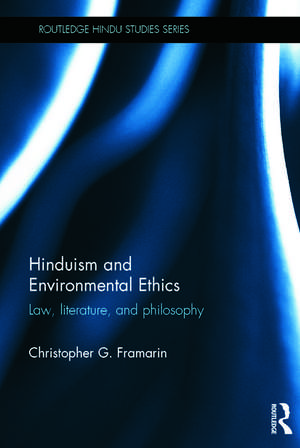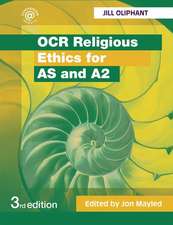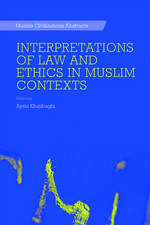Hinduism and Environmental Ethics: Law, Literature, and Philosophy: Routledge Hindu Studies Series
Autor Christopher Framarinen Limba Engleză Hardback – 6 feb 2014
This book is of interest to scholars of Hinduism and the environment, religion and the environment, Hindu and/or Buddhist philosophy more broadly, and environmental ethics.
| Toate formatele și edițiile | Preț | Express |
|---|---|---|
| Paperback (1) | 416.22 lei 6-8 săpt. | |
| Taylor & Francis – 13 oct 2017 | 416.22 lei 6-8 săpt. | |
| Hardback (1) | 1057.75 lei 6-8 săpt. | |
| Taylor & Francis – 6 feb 2014 | 1057.75 lei 6-8 săpt. |
Din seria Routledge Hindu Studies Series
-
 Preț: 312.03 lei
Preț: 312.03 lei - 15%
 Preț: 404.27 lei
Preț: 404.27 lei -
 Preț: 469.34 lei
Preț: 469.34 lei - 13%
 Preț: 335.76 lei
Preț: 335.76 lei -
 Preț: 411.42 lei
Preț: 411.42 lei - 31%
 Preț: 762.97 lei
Preț: 762.97 lei -
 Preț: 484.47 lei
Preț: 484.47 lei - 15%
 Preț: 296.53 lei
Preț: 296.53 lei - 18%
 Preț: 1059.84 lei
Preț: 1059.84 lei - 25%
 Preț: 766.65 lei
Preț: 766.65 lei - 18%
 Preț: 1059.84 lei
Preț: 1059.84 lei -
 Preț: 414.32 lei
Preț: 414.32 lei -
 Preț: 309.69 lei
Preț: 309.69 lei - 31%
 Preț: 765.43 lei
Preț: 765.43 lei - 18%
 Preț: 1054.71 lei
Preț: 1054.71 lei - 15%
 Preț: 455.81 lei
Preț: 455.81 lei -
 Preț: 446.75 lei
Preț: 446.75 lei -
 Preț: 442.68 lei
Preț: 442.68 lei - 12%
 Preț: 300.29 lei
Preț: 300.29 lei -
 Preț: 414.32 lei
Preț: 414.32 lei - 18%
 Preț: 1056.14 lei
Preț: 1056.14 lei -
 Preț: 486.42 lei
Preț: 486.42 lei -
 Preț: 475.88 lei
Preț: 475.88 lei -
 Preț: 411.85 lei
Preț: 411.85 lei - 18%
 Preț: 1222.16 lei
Preț: 1222.16 lei - 26%
 Preț: 820.73 lei
Preț: 820.73 lei - 15%
 Preț: 466.60 lei
Preț: 466.60 lei - 18%
 Preț: 1057.89 lei
Preț: 1057.89 lei -
 Preț: 469.34 lei
Preț: 469.34 lei -
 Preț: 486.98 lei
Preț: 486.98 lei - 31%
 Preț: 763.39 lei
Preț: 763.39 lei -
 Preț: 411.64 lei
Preț: 411.64 lei - 18%
 Preț: 1002.80 lei
Preț: 1002.80 lei - 26%
 Preț: 762.89 lei
Preț: 762.89 lei - 18%
 Preț: 1339.41 lei
Preț: 1339.41 lei
Preț: 1057.75 lei
Preț vechi: 1289.94 lei
-18% Nou
Puncte Express: 1587
Preț estimativ în valută:
202.39€ • 211.34$ • 167.13£
202.39€ • 211.34$ • 167.13£
Carte tipărită la comandă
Livrare economică 16-30 aprilie
Preluare comenzi: 021 569.72.76
Specificații
ISBN-13: 9780415711487
ISBN-10: 0415711487
Pagini: 206
Ilustrații: 15 tables and 5 line drawings
Dimensiuni: 156 x 234 x 20 mm
Greutate: 0.54 kg
Ediția:New.
Editura: Taylor & Francis
Colecția Routledge
Seria Routledge Hindu Studies Series
Locul publicării:Oxford, United Kingdom
ISBN-10: 0415711487
Pagini: 206
Ilustrații: 15 tables and 5 line drawings
Dimensiuni: 156 x 234 x 20 mm
Greutate: 0.54 kg
Ediția:New.
Editura: Taylor & Francis
Colecția Routledge
Seria Routledge Hindu Studies Series
Locul publicării:Oxford, United Kingdom
Public țintă
PostgraduateCuprins
Introduction 1. A Plausible Environmental Ethic 2 Instrumentalist Interpretations 3. Interconnectedness Interpretations 4. Sameness Interpretations 5. The Moral Standing of Animals and Plants in the Manusmrti 6. The Moral Standing of Animals and Plants in the Mahābhārata, Part I: The Burning of the Khāndava Forest 7. The Moral Standing of Animals and Plants in the Mahābhārata, Part II: The Dialogue on Vegetarianism and Ahimsā in the Anuśāsanaparvan 8. The Moral Standing of Animals and Plants in the Yogasūtra 9. Conclusion
Notă biografică
Christopher G. Framarin is Associate Professor in the Department of Philosophy and Department of Religious Studies at the University of Calgary, Alberta, Canada. He is the author of Desire and Motivation in Indian Philosophy, also published by Routledge.
Recenzii
‘In this study of environmental ethics in Hinduism, Framarin assesses ways in which legal, epic, and philosophical literatures of India assert that animals and plants merit moral standing. The tools of reason, narrative, and spiritual affectivity combine in this important study to elucidate key methods and approaches to decision-making found in Hinduism even today.’
Christopher Key Chapple, Loyola Marymount University, USA
"Environmental philosophy is a global matter and hence it is appropriate that it should draw on a global variety of philosophical traditions. Framarin’s new book is a study of Hindu environmental ethics focused on three key Sanskrit texts (Manusmṛti, Mahābhārata,
Yogasūtra.) The central question addressed is whether the Hindu tradition attributes direct moral standing to plants and animals.
Framarin’s original arguments for an affirmative answer and his nuanced criticisms of rival interpretations should be of interest to environmental philosophers everywhere."
Roy W. Perrett (University of Melbourne)
"This is an important new contribution from a scholar who has already established an impressive track record in the field. It takes a sophisticated environmental ethics approach to seminal Hindu texts, breaking new ground, especially on the question of the moral standing of non-human life. A must-read for anyone wishing to understand Hindu attitudes toward the natural world."
Lance Nelson, University of San Diego
Christopher Key Chapple, Loyola Marymount University, USA
"Environmental philosophy is a global matter and hence it is appropriate that it should draw on a global variety of philosophical traditions. Framarin’s new book is a study of Hindu environmental ethics focused on three key Sanskrit texts (Manusmṛti, Mahābhārata,
Yogasūtra.) The central question addressed is whether the Hindu tradition attributes direct moral standing to plants and animals.
Framarin’s original arguments for an affirmative answer and his nuanced criticisms of rival interpretations should be of interest to environmental philosophers everywhere."
Roy W. Perrett (University of Melbourne)
"This is an important new contribution from a scholar who has already established an impressive track record in the field. It takes a sophisticated environmental ethics approach to seminal Hindu texts, breaking new ground, especially on the question of the moral standing of non-human life. A must-read for anyone wishing to understand Hindu attitudes toward the natural world."
Lance Nelson, University of San Diego
Descriere
Analysing the philosophical arguments about the understanding of environment in the Hindu context, this book demonstrates the intrinsic worth of both animals and plants and argues that this, combined with doctrine of living liberation, allows a conceptual space for the validity of environmental ethics in Hinduism.














